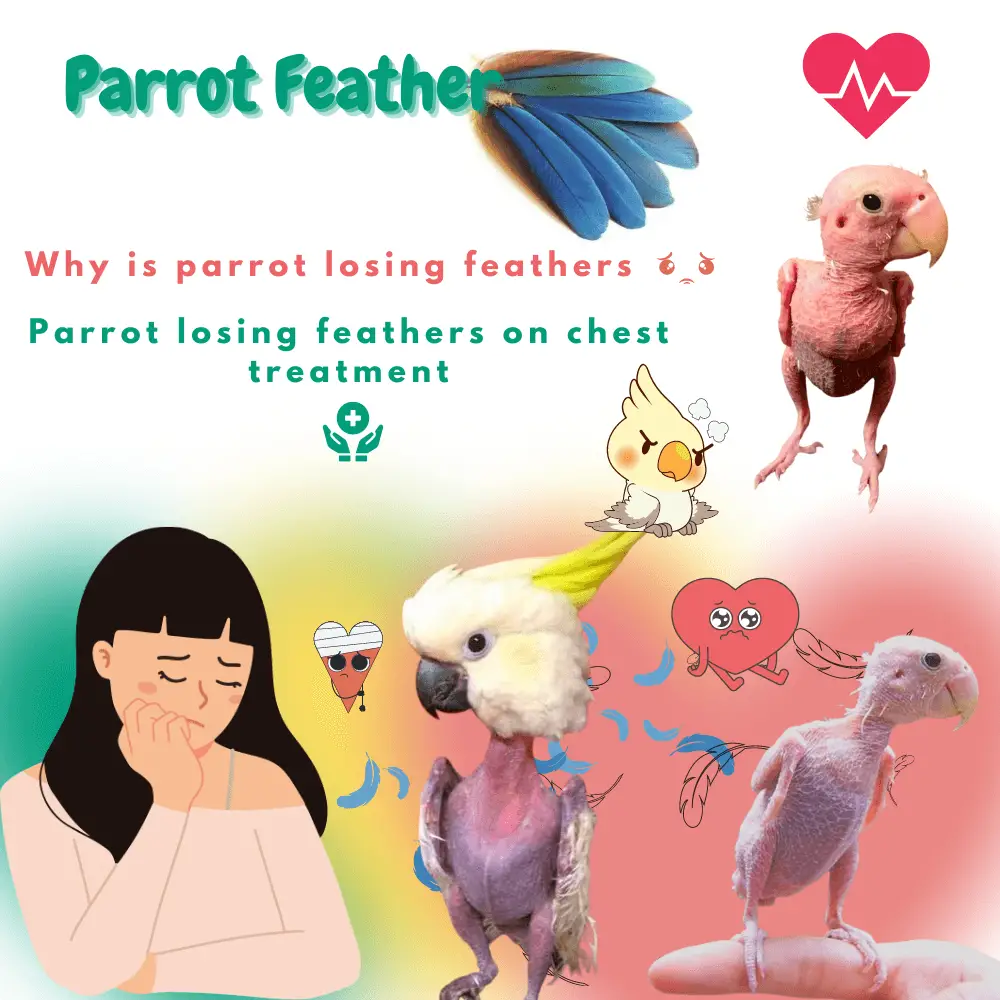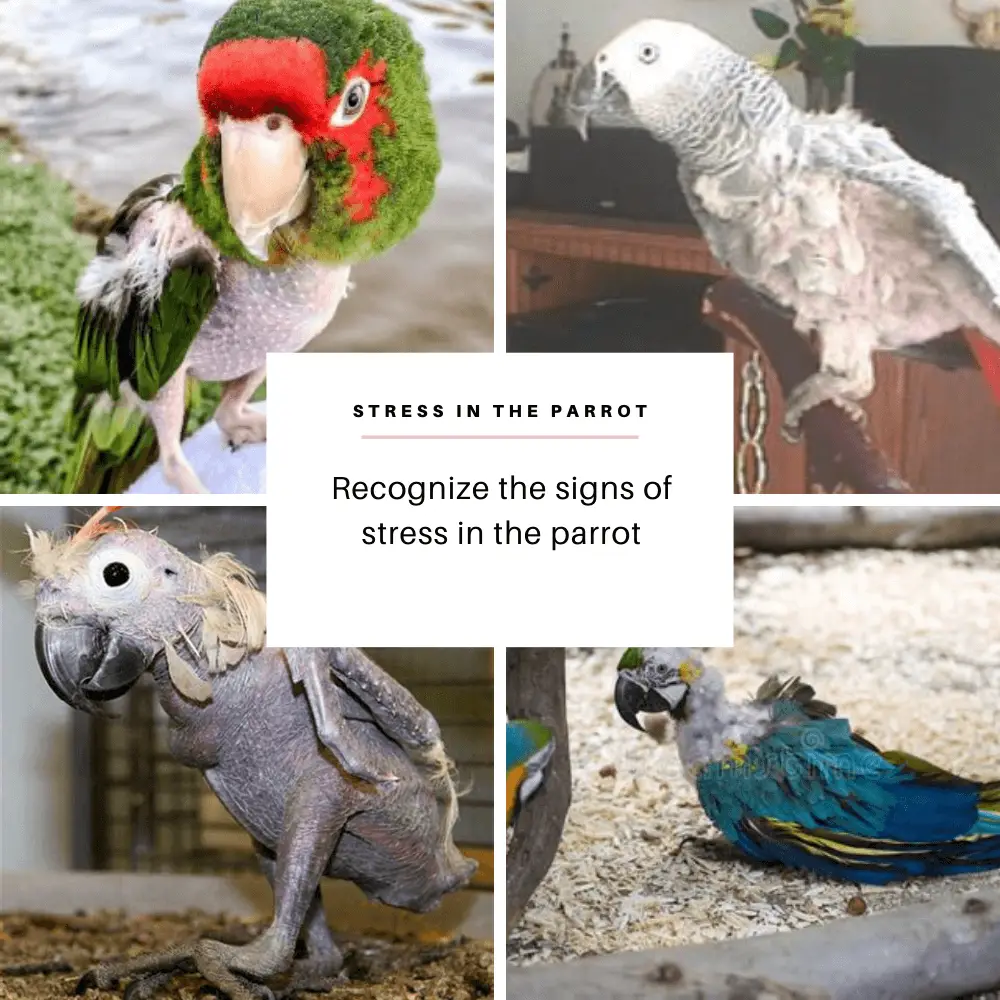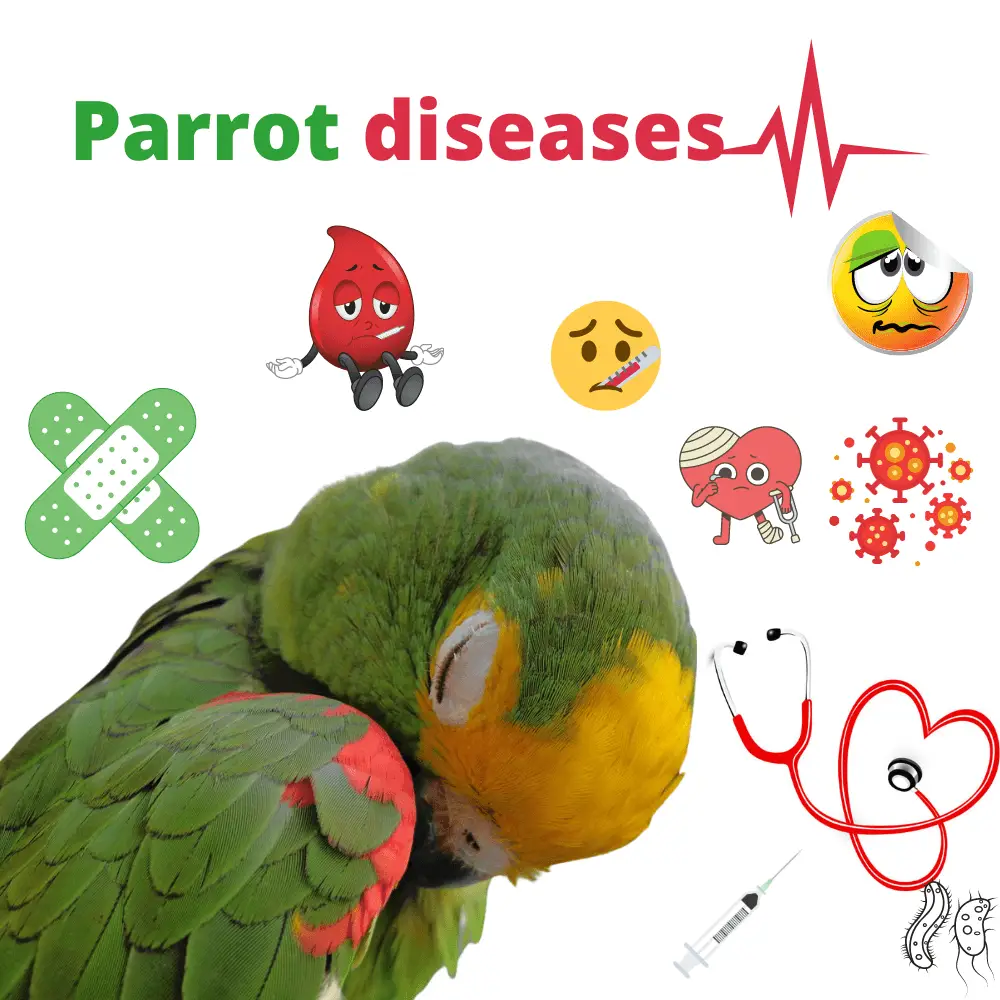Parrot diseases: Two major nervous functions are particularly developed in Parrots: vision, with large visual lobes, and orientation, with a large cerebellum. As a result, sensory functions are atrophied, especially pain: a Parrot suffers little and late, which means that many avian diseases will have late clinical repercussions. This is why you must be very vigilant: what corresponds to the first signs in the Parrot may correspond to us at an advanced stage, so you must not miss them.
Parrot feather

Parrot diseases
These are the easiest to detect, your Parrot is losing feathers! Not to be confused with a normal molt, where the feathers regrow.
Causes
The main reasons are an abnormal molt (often linked to nutritional deficiencies), external parasites such as red lice or mites (the Parrot scratches itself), feather pecking where the animal pulls out its own feathers (the stress or boredom may be responsible) and finally the follicular cyst (formation of a cyst at the base of the feathers, especially in canaries).
What to do?
Start by checking that the diet is balanced: if necessary, buy vitamin supplements for plumage. Then check the hygiene of the cage, it is a major cause of parasitosis, especially if you have recently introduced a new Parrot. Finally, check nearby for the absence of a source of stress (noise, visual phenomena, etc.) or other animals (mice, rabbits, etc.) likely to transmit certain parasites.
If symptoms persist, it is advisable to consult a specialist.
Our advice: In spring and autumn, give your Parrot a special plumage vitamin cure. There are many on the market, adapted to each species.
Beak problems in parrots
Scales or crusts form in the keratinized areas (beaks and legs), which may look like dried breadcrumbs. If the itching is severe, traces of blood are visible. When the pathology is old, there may be large deformations, disabling the Parrot.
Causes
Let us mention the most frequent:
- avian scabies, caused by mites (the itching is severe).
- poxviruses, due to the avian pox virus (a serious contagious disease, but not transmissible to humans). The lesions can be impressive, especially in canaries.
- avian gout, due to a change in diet (painful joints can cause the Parrot to limp).
- frostbite, in Parrots accidentally exposed to cold
What to do?
As before, start first by checking the parrot’s diet and general hygiene. If the lesions are light, you can dab them once or twice a week with an iodine antiseptic or a little cade oil.
Our advice: Be very gentle when handling your Parrot, it can stress easily and cause cardiac arrest. Never insist if he panics.
Parrot breathing heavy
The clinical signs are variable, depending on the condition: discharge around the eyes and beak, or jerky and accelerated breathing are warning signs. In some cases, you may even have pus or mucus near the beak.
Causes
The most common cause is simple cooling, related to hot and cold.
But there can be more serious complications, most of the time bacterial: pasteurellosis or ornithosis-psittacosis can be extremely serious. The latter mainly affects parrots and is transmissible to humans: it is a zoonosis, so be very vigilant. Note that the various Parrot flus can only develop after direct or indirect contact with wild Parrots.
What to do?
If your Parrot remains in good shape, you can try to clean the serums and fumigate it with a suitable product: leave the Parrot in its cage, the fumigation bowl outside and cover everything with a sheet for a few minutes.
On the other hand, if your Parrot is weakened or breathing badly, consult quickly.
Our advice: Never place your Parrot near a radiator or a place with strong temperature variations. In summer, watch out for fans!
Parrot digestive system
When you clean the cage, always pay attention to the droppings, a mixture made up of feces and urine: any change in color, consistency, or volume should be a sign of concern. There may be a temporary and normal change if you just changed the diet.
Causes
Dietary changes, parasites (coccidiosis), or bacteria (colibacillosis) can cause these disorders, which are sometimes very serious. Most infectious Parrot diseases, however, require external contamination: this is the case for Parrots living in a community, or have lived there recently (just after purchase from a pet store, for example).
What to do?
In general, avoid any dietary changes. If you have to, do it gradually over several days. Cage hygiene is essential to prevent any microbial proliferation. Remember to change your Parrot water regularly, avoiding cold water: like a baby, dehydration can complicate diarrhea and be fatal. If the diarrhea is mild, you can try adding probiotics to the diet, or even a little activated charcoal.
Our advice: If you introduce a new Parrot to your home, do not put it with the others right away, separate it for a few days to check that it is doing well.
Diseases from parrots

Parrot diseases
They manifest themselves mainly through a change in behavior. A curled-up, apathetic Parrot that isolates itself or eats less is potentially worrying. Even a banal sign, like a Parrot that is no longer singing, should grab your attention.
Causes
The causes are extremely numerous because they can be specific (anemia, nutritional deficiencies, egg retention, internal tumor, etc.) or not: all the pathologies considered above can appear late and therefore manifest themselves by a general attack. Do not forget, the Parrot suffering little, what you take for the beginning of the disease, can be a state already well advanced.
What to do?
In the event of serious impairment of the general condition, it is necessary to consult because the situation can quickly deteriorate. In summer, think of heat stroke: your first instinct should then be to slightly wet your Parrot, especially on the top of its head.
Our advice : Never wait too long with a sick Parrot. Its resistance to pain is a force in nature, but a real handicap in detecting the onset of any Parrot diseases.
The best prevention, therefore, remains to observe it well every day.
SOURCE: Love of Pets


